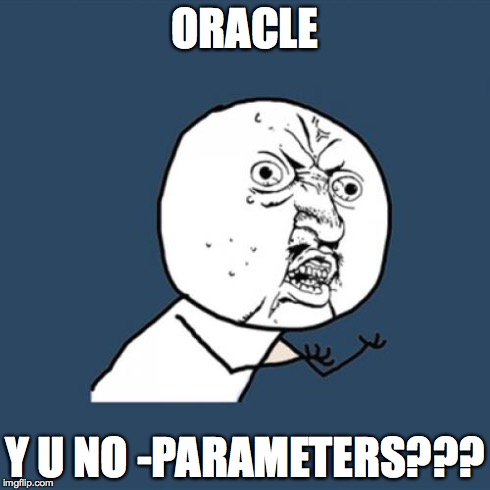Java 8 Parameter Names and Dogfooding
Java 8 received most of its praise for the support of lambdas and streams, but many framework developers certainly rejoiced that the JVM now finally supports parameter names.
Do not repeat yourself
Many frameworks try to take advantage of conventions to ease the programming models, which translates to something like this with, say, Spring MVC:
@RequestMapping(value = "/login", method = RequestMethod.POST)
public String login(
HttpSession session,
@RequestParam("login") String login,
@RequestParam("password") String password) {
// (...)
return "redirect:/";
}The @RequestParam annotation is inherently inelegant: in an ideal world it should only be used
when a parameter name does not match a request parameter. In practice the annotation value is most
always the same as the parameter name, but going through the annotation is the only reliable way to
pass a name to the framework.
What’s in a parameter? (before Java 8)
On the JVM, a parameter or a local variable is simply a 0-indexed number. In the login method
example above, this is at index 0, login at index 1 and password at index 2. There is simply
no name encoded in the bytecode to be accessed through reflection.
This is not 100% true as compiling Java code with debug symbols (which one should always do) gives the names for debuggers. There are hacks to get parameter names through debug symbols, including reading bytecode, but it’s never perfect to rely on something that may or may not be present.
“Do as I say, not as I do” (Java 8)
Now that Java 8 supports parameter names to be accessible though reflection, the problem is supposed to be solved.
There is just one little problem: one needs to compile with javac -parameters, and the -parameters flag is off by default. And guess what? The JDK is not compiled with that flag!
Here is a simple showcase:
import java.lang.reflect.Method;
import java.util.ArrayList;
import java.util.Arrays;
// Requires `javac -parameters`
public class Main {
public static void foo(String bar, int baz) { }
public static void main(String... args) throws Throwable {
Method method = ArrayList.class.getMethod("add", int.class, Object.class);
Arrays.stream(method.getParameters()).forEach(System.out::println);
method = Main.class.getMethod("foo", String.class, int.class);
Arrays.stream(method.getParameters()).forEach(System.out::println);
}
}Running that code prints:
int arg0
E arg1
java.lang.String bar
int baz
How can the JDK classes be compiled without parameter names is just beyond me…
Parameter names in Golo
The next versions of Golo will support parameter names:
struct Foo = {x, y}
# (...)
let f = |x, y| -> x - y
let r_1 = f(x=10, y=2)
let r_2 = f(y=10, x=2)
let foo = Foo(y="b", x="a")We had lots of discussions with Daniel on how to properly do that. Initial experiments used an annotation to encode parameter names, but as we shifted to Java SE 8 as a requirement we opted for using the parameter name support in the bytecode.
This works marvelously well for Golo, and we can even take advantage of Java libraries compiled with
javac -parameters to call methods using parameter names, just like Golo functions.
Conclusion
